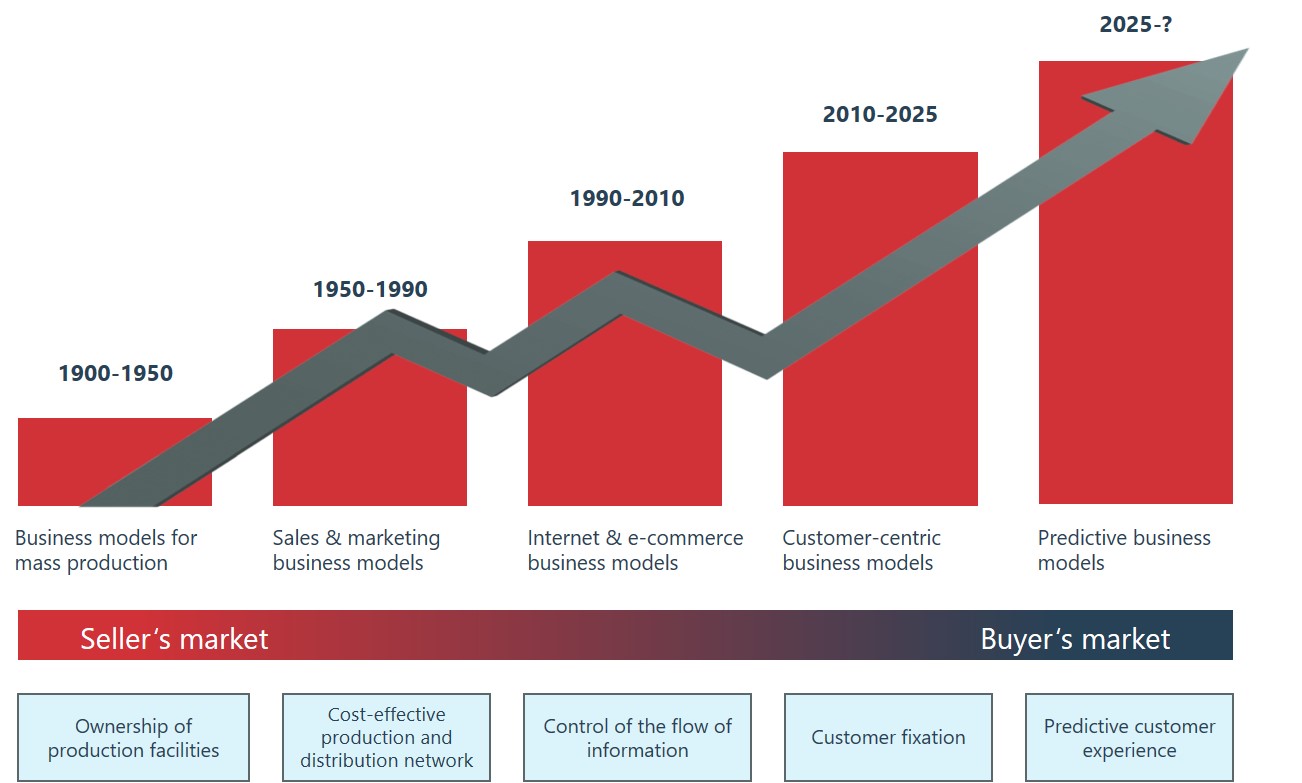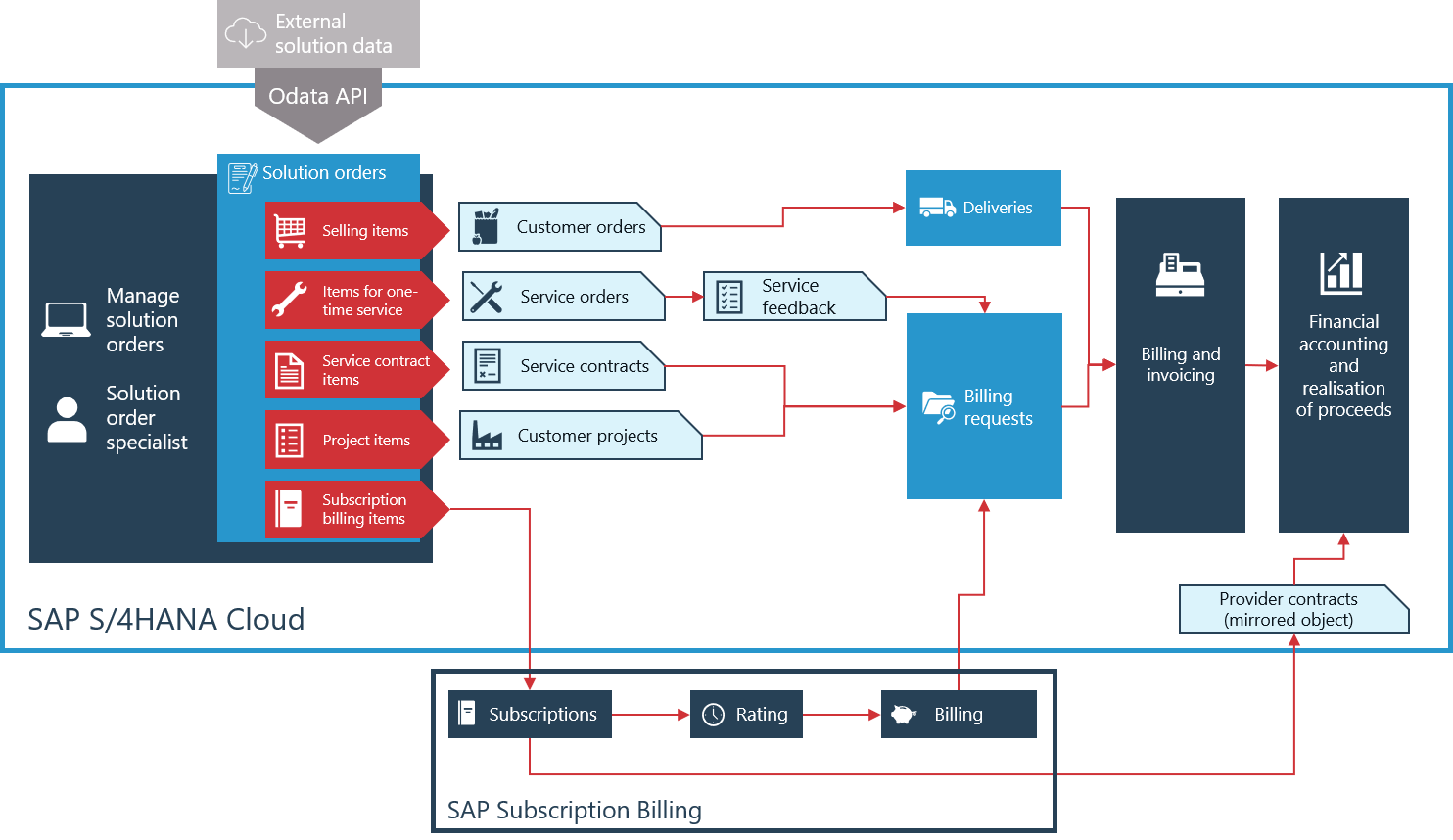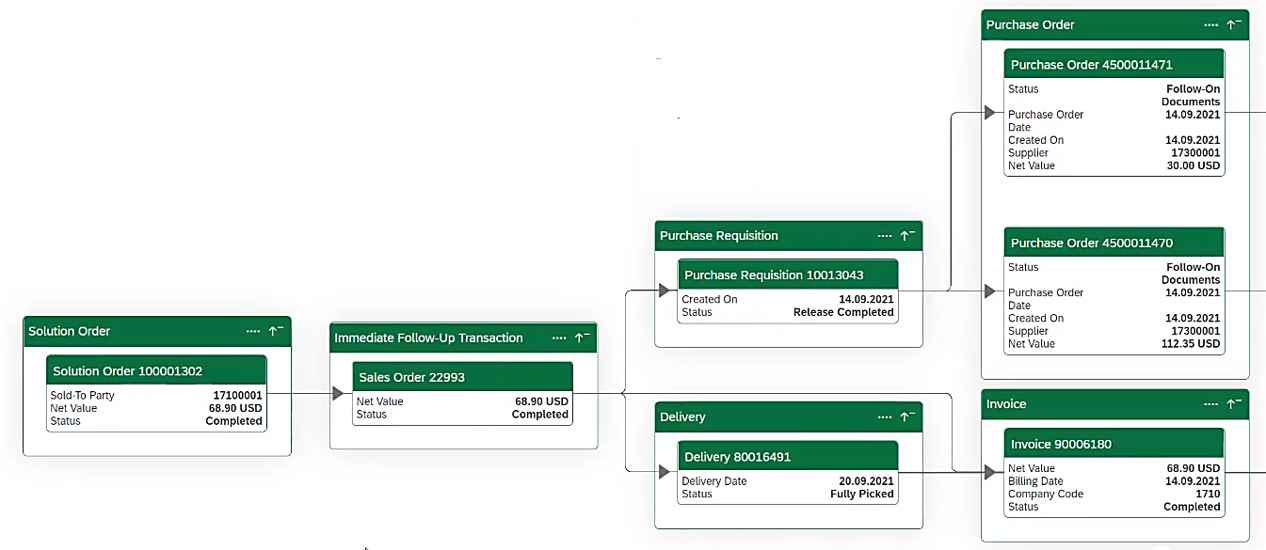New challenges, constantly developing business models, and the need to maintain competitiveness in the market are all pushing companies not only towards innovation, but also towards a continual readiness to adapt corporate structures to the needs of our current times.

Figure 1: Seller’s to buyer’s market – the evolution of business models
Whilst traditional business models are all about purely selling physical goods and services, now we are observing an increasing shift towards “servitization” or “everything-as-a-service” business models. The reason for this is the trend that more and more producing companies are offering additional services, which go far beyond the classic after-sales service or spare parts business. Companies are transforming from producers into complete solution providers. This is not only changing the way in which products and services are consumed, but also how and when they are ordered and paid for.
This trend is challenging traditional business models as it aims to retain customers for life with long-term and recurring sources of revenue. These types of business models mean that products and services can be offered in an entirely new way.
An order management solution is needed, which recognizes all components of the order and is capable of managing every step of the process – from entry to fulfillment, service, and billing, right through to management of the profitability of the bundled solution.
The focus of Solution Orders (as they are known in SAP S/4HANA Cloud) is on the needs of the customer. Companies that have committed to these business models offer a combination of physical goods, services, and subscriptions to fully meet the needs of their customers. At the same time, customers benefit from a solution from a single source.
Whether they are offering products or services, these new models are now extending the responsibilities of the company beyond the initial sale. They affect all elements of a solution throughout the entire life cycle, such as the delivery of a machine, its installation, and the corresponding maintenance services. The technical and commercial services need to assist customers during this life cycle, whilst also minimizing the commercial risk for the solution provider. The provision of this kind of solution-based value maximizes customer satisfaction and promotes margin growth through the sale of higher-value services.

Figure 2: Solution Order Workflow
2. Orchestration of Solution Order
The orchestration of Solution Orders covers the automatic creation of follow-on commercial transactions from the Solution Order items, such as a service order from a service item. The automatic forward and reverse data exchange during the end-to-end process is also included. The same applies to the current status of the service confirmation, invoicing, and any refusal from the service order.

Figure 3: Overview of processes relevant to the order (orchestration)
The orchestration function works together seamlessly with Situation Handling within the SAP S/4HANA Cloud to provide the employees with information along the end-to-end process, and notify them about steps that need to be performed manually.
3. Progress Monitoring of Solution Order
SAP S/4HANA Cloud offers a detailed overview using the end-to-end process in the form of a color-coded graphic. From the graphic, customers can navigate to the respective commercial objects to solve any problems directly. The Solution Order progress also contains a list with the Solution Order items in addition to the graphic.
4. Solution Orders Specialists
There is the option of defining special roles for the Solution Order specialists to manage the flow, data, and tasks. This controls the access and the privileges for the Solution Order and the corresponding apps. A Solution Order specialist can gain an overview of the progress of a Solution Order, which can consist of various follow-on documents in the form of a network diagram on the progress page of the Solution Order. However, they should also be capable of navigating to each follow-on document to obtain additional details on a certain document.
5. Solution Order Analytics
The analytics options are one of the strengths of the SAP S/4HANA Cloud because they are fully integrated in all functions. The analytics, which are activated by default, support context and role-based insights in real-time data. A Solution Order can be searched for in various apps for sales analytics and displayed as a reference transaction in the process sequence for following up customer order details.
Advantages of Solution Order Management and Conclusion
In an initial step, the SAP S/4HANA Cloud allows a quick design and the sale of integral offers, which are integrated in the order-to-cash process. Furthermore, companies are given the opportunity of new business models in which a number of different pricing models can be offered. These can include subscriptions for one-off, recurring, and usage-related offers. SAP Subscription Billing allows flexible pricing plans to be designed, analyzed, and billed from measured usage data from technical systems, such as sensors from the Internet of Things (IoT). Subscriptions are now part of the consistent quote-to-cash process, which is integrated in the SAP S/4HANA Cloud. All subscriptions can be managed end-to-end.
Moreover, billing data can be flexibly integrated into a single invoice, which is consistent with the order, from various sources such as a one-off order, long-term contracts, deliveries, and external data. As companies do have to pay attention to the profitability of their solutions, SAP S/4HANA Cloud offers margin analysis for orders including all elements of the package. It also automates the turnover recognition for sales products, service contracts, recurring subscriptions, and projects whilst also helping with a simplified period-end closing.
Solution and subscription models are hugely important to companies in all kinds of sectors. The management of Solution Orders demonstrates that considerable added value is generated from the innovation of business processes. By integrating order-to-cash processes with the aid of the latest technological innovations, customers can develop new opportunities for growth.
